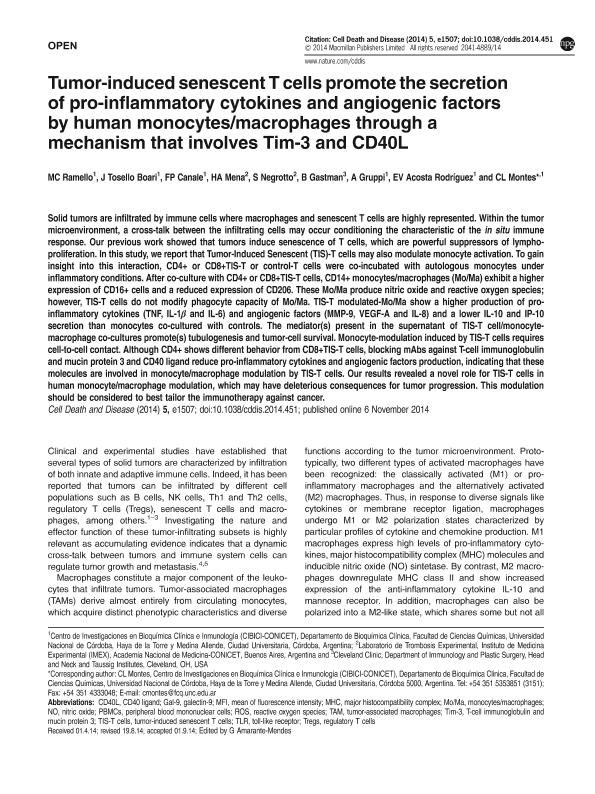Artículo
Tumor-induced senescent T cells promote the secretion of pro-inflammatory cytokines and angiogenic factors by human monocytes/macrophages through a mechanism that involves Tim-3 and CD40L
Ramello, María Cecilia ; Tosello Boari, Jimena
; Tosello Boari, Jimena ; Canale, Fernando Pablo
; Canale, Fernando Pablo ; Mena, Hebe Agustina
; Mena, Hebe Agustina ; Negrotto, Soledad
; Negrotto, Soledad ; Gastman, B; Gruppi, Adriana
; Gastman, B; Gruppi, Adriana ; Acosta Rodriguez, Eva Virginia
; Acosta Rodriguez, Eva Virginia ; Montes, Carolina Lucia
; Montes, Carolina Lucia
 ; Tosello Boari, Jimena
; Tosello Boari, Jimena ; Canale, Fernando Pablo
; Canale, Fernando Pablo ; Mena, Hebe Agustina
; Mena, Hebe Agustina ; Negrotto, Soledad
; Negrotto, Soledad ; Gastman, B; Gruppi, Adriana
; Gastman, B; Gruppi, Adriana ; Acosta Rodriguez, Eva Virginia
; Acosta Rodriguez, Eva Virginia ; Montes, Carolina Lucia
; Montes, Carolina Lucia
Fecha de publicación:
11/2014
Editorial:
Nature Publishing Group
Revista:
Cell Death and Disease
ISSN:
2041-4889
Idioma:
Inglés
Tipo de recurso:
Artículo publicado
Clasificación temática:
Resumen
Solid tumors are infiltrated by immune cells where macrophages and senescent T cells are highly represented. Within the tumor microenvironment, a cross-talk between the infiltrating cells may occur conditioning the characteristic of the in situ immune response. Our previous work showed that tumors induce senescence of T cells, which are powerful suppressors of lympho-proliferation. In this study, we report that Tumor-Induced Senescent (TIS)-T cells may also modulate monocyte activation. To gain insight into this interaction, CD4+ or CD8+TIS-T or control-T cells were co-incubated with autologous monocytes under inflammatory conditions. After co-culture with CD4+ or CD8+TIS-T cells, CD14+ monocytes/macrophages (Mo/Ma) exhibit a higher expression of CD16+ cells and a reduced expression of CD206. These Mo/Ma produce nitric oxide and reactive oxygen species; however, TIS-T cells do not modify phagocyte capacity of Mo/Ma. TIS-T modulated-Mo/Ma show a higher production of pro-inflammatory cytokines (TNF, IL-1β and IL-6) and angiogenic factors (MMP-9, VEGF-A and IL-8) and a lower IL-10 and IP-10 secretion than monocytes co-cultured with controls. The mediator(s) present in the supernatant of TIS-T cell/monocyte-macrophage co-cultures promote(s) tubulogenesis and tumor-cell survival. Monocyte-modulation induced by TIS-T cells requires cell-to-cell contact. Although CD4+ shows different behavior from CD8+TIS-T cells, blocking mAbs against T-cell immunoglobulin and mucin protein 3 and CD40 ligand reduce pro-inflammatory cytokines and angiogenic factors production, indicating that these molecules are involved in monocyte/macrophage modulation by TIS-T cells. Our results revealed a novel role for TIS-T cells in human monocyte/macrophage modulation, which may have deleterious consequences for tumor progression. This modulation should be considered to best tailor the immunotherapy against cancer.
Palabras clave:
Cancer
,
Cell Signalling
,
Inflammation
,
T Cells
Archivos asociados
Licencia
Identificadores
Colecciones
Articulos(CIBICI)
Articulos de CENTRO DE INV.EN BIOQUI.CLINICA E INMUNOLOGIA
Articulos de CENTRO DE INV.EN BIOQUI.CLINICA E INMUNOLOGIA
Articulos(IMEX)
Articulos de INST.DE MEDICINA EXPERIMENTAL
Articulos de INST.DE MEDICINA EXPERIMENTAL
Citación
Montes, Carolina Lucia; Acosta Rodriguez, Eva Virginia; Gruppi, Adriana; Gastman, B; Negrotto, Soledad; Mena, Hebe Agustina; et al.; Tumor-induced senescent T cells promote the secretion of pro-inflammatory cytokines and angiogenic factors by human monocytes/macrophages through a mechanism that involves Tim-3 and CD40L; Nature Publishing Group; Cell Death and Disease; 5; 11-2014; 1-9
Compartir
Altmétricas



